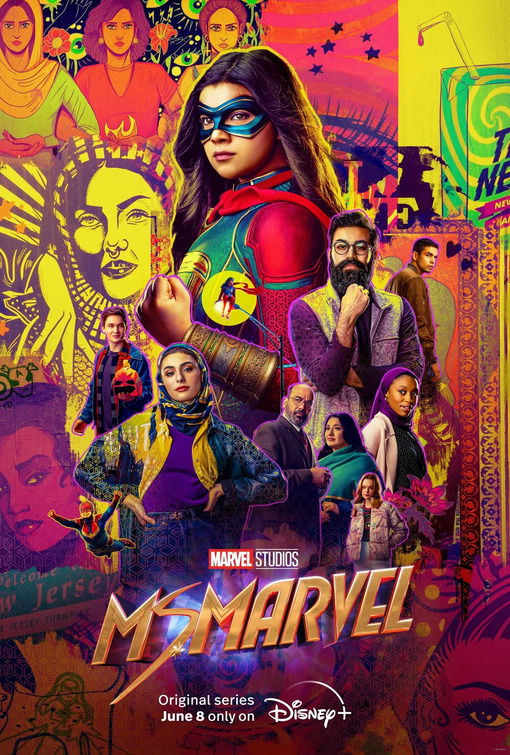“Has Marvel Officially ‘Jumped the Shark?’”

| None | Light | Moderate | Heavy | |
|---|---|---|---|---|
| Language | ||||
| Violence | ||||
| Sex | ||||
| Nudity |
What You Need To Know:
The final Season One episodes of MS MARVEL contain decent action scenes and some interesting worldbuilding. However, the exposition is sometimes dull and not well developed. For example, the origin of the heroine’s superpowers is never really fully explained. In addition, the heroine’s antagonists are as interesting as soggy cardboard. The program’s only saving grace is a moving sequence in Episode 5 involving the heroine’s great grandparents. The sequence ends with the heroine traveling back in time to save their daughter. MS. MARVEL also has a strong Romantic, politically correct worldview that promotes a feminist view and celebrates the heroine’s Muslim background, especially in the final episode.
Content:
Episodes 3-6 of the first season of MS. MARVEL on Disney+ continue the strong Romantic, politically correct worldview of the first two episodes, which promotes a feminist view of women and men (the female characters are stronger, and the male characters are weaker) and which promotes the false religion of Islam, with some moral elements in a subplot where the Muslim, feminist, slightly Americanized heroine fights a small group of long-living people from another dimension, led by a villainous woman with a teenage son (the woman murdered the heroine’s great grandmother to obtain a magical bracelet that may be an alien artifact), and the heroine tries to stop a fight between the teenage son who has obtained super powers and some government agents commanded by a rogue female agent
Two or three instances of “h” and “d” words throughout episodes three through six, each episode contains about two to five light profanities, and Episode Four contains two borderline profanities in Arabic that mean “In the name of Allah”
Strong and light action violence such as heroine fights a group of people from another dimension whose actions endangers her Muslim community in New Jersey and eventually the planet, the heroine and an ally of hers cause an explosion during a chase scene through the streets of Kurachi in Pakistan, vehicles crash into other vehicles and into street stalls during long chase scene in Kurachi, two women get near a dangerous portal to an alternate dimension, and their skin and body burns to purple ashes, there’s archival footage of the violent 1947 Partition of Pakistan from India, heroine’s great grandmother throws a knife at a British soldier and kills him, the great grandmother’s enemy stabs her in the chest and leaves her for dead, a villain kills an older man who was trying to mentor the heroine, teenage boy uses his newfound stretchy limbs to knock out several agents at a public school teenagers pummel government agents with softballs, heroine creates a cosmic shield to deflect military-grade assault rifles, a military drone blows up a New Jersey convenience store, etc.
No sex scenes but, in Episode Five, a Muslim woman falls for a Muslim farmer who speaks in favor of independence from Britain, the woman becomes pregnant, and they have a daughter, but there’s no wedding ceremony or reference to marriage
No nudity
No alcohol use
No smoking or drugs; and,
A forced “lecture” on the Pakistan-India partition in 1947, Muslims blame British and Hindus on the violence and social upheaval of the partition and seem to absolve Muslims and portraying them as the victims (this appears to indicate the series is infected by communist Critical Race Theory), teenagers use social media to help demoralize U.S. government agents, a government agency issues a lockdown all over New Jersey and interrogates Muslim-centric neighborhoods, government agents search mosque without search warrants.
More Detail:
Episodes Three through Six of MS. MARVEL expand on Kamala’s complicated relationship between herself and her family’s Pakistani legacy. As she figures out her stretchy limbs and ability to create cosmic crystal platforms, fists and walls, the Department of Damage Control deems her a threat.
In the first two episodes, Kamala saved two bystanders from death. However, her inexperience posed a public safety concern for the agency. Kamala evades the agents and discovers the existence of an unstable alternate dimension, which threatens to consume Earth if left unchecked.
Episode 3, “Destined”:
In the last episode, Kamala narrowly avoided capture from the Department of Damage Control, a government agency bent on capturing rogue superheroes, by Kamran, a new teenage boy Kamal just met and found attractive. Kamran introduces her to the “Clandestines,” a group of enhanced beings exiled from the “Noor” dimension. Why they were exiled is never explained.
Najma, Kamran’s mother, pleads to Kamala to use her magic bracelet to send the Clandestines back to their home realm. Kamala agrees, but claims she needs more time to master her finicky powers.
Kamala procrastinates by attending her brother’s wedding, but Damage Control crashes the party. Kamran’s mother and her henchmen try stealing the bangle from Kamala. During the fight, the bracelet reveals a magic vision of a steam-powered train. Kamala and her friend, Bruno, escape while Damage Control captures the Clandestines.
Meanwhile, Kamala’s grandmother, Sana, also saw the vision of the train, and she urges Kamala’s mother, Muneeba, to bring the family to visit her in Kurachi, Pakistan.
Episode 4, “Seeing Red”:
[SPOILERS FOLLOW] In Karachi, Kamala shares her secret “train vision” with her grandmother Sana. Sana deduces that the vision and the bracelet are connected to Kamala’s great grandmother Aisha. Kamala investigates an abandoned train station but is ambushed by a young “Red Dragon,” Kareem. Kareem warns Kamala that the Clandestines are trying to pierce the Veil of Noor, which prevents the Noor dimension from infecting the human world with dark matter.
Kareem and the Red Dragon leader, Waleed, mentor Kamala on harnessing her supernatural abilities. However, Najma and the Clandestines have escaped a Damage Control black site and catch up to Kamala. After a wild chase sequence, Clandestine leader Najma demands the magic bangle for herself. She stabs Kamala’s bracelet. The wristband goes haywire and unleashes a tidal wave of energy over Kamala and the Clandestines. The outburst sends Kamala back in time to 1947 India, to the train station, where Kamala’s great grandmother, Aisha, disappeared and her husband and their little daughter, Kamala’s grandmother, boarded the train to newly created Pakistan.
Episode 5, “Time and Again”:
The series cuts to a brief newsreel of the Indian-Pakistani Partition of 1947. The Partition occurred when India gained independence from British rule. As part of this deal, India split into two nations, the Muslim-occupied Pakistan and the Hindu-majority India. However, such a split brought out massive hostilities between Muslims and Hindus. MS. MARVEL treats this event as a perilous and chaotic transition.
The movie cuts to 1942. Aisha, Kamala’s great grandmother kills a British officer, takes refuge in a village, falls in love with a Muslim farmer, and gives birth to her daughter, Sana. Five years later, Najma finds Aisha and orders her to retrieve the bracelet. Aisha agreed to help Najma return to her home dimension, but realized how traveling through the Veil of Noor could consume the world in darkness.
After Najma leaves, Aisha hands the bracelet to Sana for safe keeping. She and her husband, Hasan, decide to flee from Hindu violence against Muslims and head to the newly-created Pakistan. They end up in a train station packed with hundreds of Muslims trying to get to Pakistan. However, Najma finds Aisha and fatally stabs her to death for backing out of the deal. Sana and her father get lost in the shuffle.
Kamala then wakes up with the crowd and spots the mortally injured Aisha. She promises Aisha to lead her daughter back to her husband. Kamala returns the lost Sana to her father.
Kamala travels back to the present and finds that, when Najma struck the bracelet with her knife, she opened a crack in the Veil of Noor. One of Najma’s minions, a black woman, tries to go through the Veil, but it destroys her body in horrific fashion. Kamala convinces Najma that the crack, if it expands, will kill everyone on Earth, including her son, Kamran, who she left behind when she escaped the Damage Control prison. Najma transfers her powers to Kamran before she sacrifices her life to close the Veil.
Back in Jersey City, Kamran has escaped from Damage Control and tries to confide in Bruno. However, a Damage Control Drone catches up to him. Kamran attacks the drone, but the machine wounds him and decimates the first floor of Bruno’s apartment complex.
To episode five’s credit, Aisha’s story is genuinely captivating. It weaves real life history organically into an otherwise fantastical universe. It delivers action scenes that were so desperately missing in the first two episodes. The acting from Aisha and Kamala is also commendable. Episode Five is easily the best episode of MS. MARVEL, with the least offensive content.
Episode 6, “No Normal”:
Damage Control begins a city-wide search for the two teenage fugitives, Kamran and Bruno. Kamala hears what happened to them. So, after revealing the truth about the bracelet to her family, she, her brother and her other friends organize to help Kamran and Bruno. However, the Damage Control agents are hot on Bruno and Kamran’s trail. So, everyone convenes at the high school to create a huge diversion for Damage Control so that Kamala can sneak Kamran to a boat that will take him to Kareem and the Red Dragon in Pakistan.
Conclusion:
The last four episodes of MS MARVEL contain decent action scenes and some interesting worldbuilding. Otherwise, it is just as dull and mediocre as its introductory episodes. The “multidimensional” aspect is vaguely explained and comes off as an afterthought. In addition, the origin of the superpowers of Kamala and the female villain’s teenage son are never really explained, though they may have something to do with alien technology and genetic engineering. Furthermore, the scenes explaining the Clandestines and Damage Control are dry and tedious. Also, both factions pose no credible threat to the heroes. The foul language and lewd content in MS. MARVEL are minimal, but the action violence ramps up in Episodes Four through Six. For example, characters get stabbed in the chest, two people literally disintegrate when they approach a multidimensional portal and there’s a final big battle with the Department of Damage Control.
Throughout MS. MARVEL, there are multiple references to the Muslim faith of the characters. The program uses this background as flavoring to the generic Marvel, Disney+ television template. For example, Episodes 3-6 has Kamala praying and attending Muslim functions. Although at several points, Kamala says, “Oh my God,” at another point, in Episode Four, she uses an Arabic epithet meaning, “In the Name of Allah!” Generally, MS. MARVEL also portrays Kamala’s Muslim community as the underdogs. For instance, Damage Control harasses her mosque and searches the place without a warrant. It’s not until Kamala stands up to Damage Control does her Muslim community kick out the unjust government agents. Eventually, her family and the people at her mosque, including the Imam, celebrate the fact that Muslims finally have their own superhero.
MS. MARVEL also visits the political, social turmoil of the India-Pakistan Partition of 1947. However, it lays all the responsibility for the mess, where thousands of Muslims and Hindus killed each other, on the British Viceroy, Lord Mountbatten, and the Hindus. In reality, Muslims also killed many Hindus, and major Muslim groups, like the Muslim League, also agreed with Mountbatten about the need for the partition.


 - Content:
- Content: 

